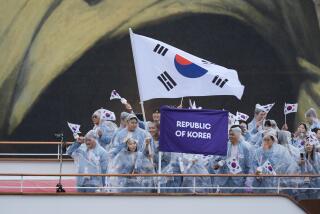Soviets Send Olympic Signals
- Share via
The suspense, what there was of it, is now ended. The Soviet Union says that it will go to this summer’s Olympic Games in Seoul. That brings to 153 the number of countries accepting invitations to the event, besting the record 140 that came to Los Angeles in 1984. It should also mark the first time in 12 years, after the 1980 Western boycott of the Moscow Olympics and the Soviet refusal to attend the Los Angeles games, that American and Russian athletes will have a chance to meet on Olympic playing fields. But the significance of the Soviet decision isn’t limited to its implications for international athletic competition. By agreeing to send its team to South Korea, bitter enemy of Soviet ally Communist North Korea, Moscow is making a politically important gesture.
That gesture has been presaged in recent years as various Soviet and East European athletic groups have taken part in events in South Korea, which no Communist country recognizes diplomatically. In announcing its plan to go to Seoul the Soviet Olympic committee offered pro forma support for North Korea’s demand that it be given a full role as a co-host of the games. But Soviet attendance hasn’t been made conditional on the north getting what it wants. The International Olympic Committee some time ago offered North Korea four relatively minor venues. The Pyongyang regime continues to insist that it must have more. The IOC isn’t likely to yield. Pyongyang, on the verge of boycotting the games in Seoul, nonetheless recently said that it was rushing to construct hotels and other facilities to prepare for Olympic visitors who are unlikely to show up.
Moscow now seems to be reminding its Korean ally that its political support has limits. By extension it’s also indicating that Pyongyang had better behave itself and put aside any thoughts of trying to disrupt the Seoul games. The Soviets may further be signaling an interest in more cordial relations with strongly anti-Communist South Korea --a path that China quietly began taking some years ago. Finally, Moscow is acting to support its claim that the Soviet Union is not only an Asian power but also one with growing regional interests. What should be welcome news for the Olympic movement could also prove interesting for political developments in Northeast Asia.
More to Read
Go beyond the scoreboard
Get the latest on L.A.'s teams in the daily Sports Report newsletter.
You may occasionally receive promotional content from the Los Angeles Times.






